So, I decided to spend Christmas in my site rather than in the city, which you probably already knew. On the 23rd I made about four dozen sugar cookies as a gift for the family because they had mentioned that they would like to do something that was a Christmas tradition in the states. I found some good tips for baking at this altitude; adding more liquid, using more shortening, cooking at a lower temperature, and using less baking powder. They turned out surprisingly well and were my first Altiplano baking success. My host brother, Javier, and I decorated the living room with some things the previous volunteer left behind.
Christmas Eve started out the same as any other day- with laundry and cooking. My host dad (Braulio), Javier, and I went to the city to get a few final things for the celebration. When we returned, there were a bunch of aunts, uncles, and cousins at the house.
There was also a sheep. When I asked the kids why there was a sheep there, I was informed that the sheep was for the Christmas meal the following day. They wanted some pictures of the sheep while it was still alive.
The weather was calm and the sky was beautiful. It’s summer here, but that doesn’t mean much in the altiplano. It’s hot when it’s sunny and chilly when it’s not. I hear it gets a lot colder in the winter. Yikes.
The women chatted and got ready to cook as the kids and I took up a more American tradition; playing board games. They have a Star Wars-Monopoly type game and we tried to play that, but it turned out to be too complicated for the little ones and the babies kept knocking over the board.
This seems to be a lesson I learn year after year: Monopoly is not a good game to play at family gatherings. ;) So we stuck to a card game the kids really liked where they hand out cards and the winner is whoever has the highest number or the highest sum. We also played BINGO which was pretty fun. Both days we took lots and lots of photos and videos, giving everyone who wanted a chance to try out my camera, despite the worries of the adults.
At midnight, the women made Buñuelo (fried dough) and Api (a sweet grain drink, I think made from corn). I really like both- they’re delicious.
I made eggnog and brought out the sugar cookies. I didn’t know the word for “nutmeg” (and my dictionary is on-loan to someone) so the eggnog didn’t quite taste like eggnog, but it was good.
After all the sugar and hot drinks, we were pretty tired, so we called it a night. The next morning, I slept in despite hearing all the kids’ excitement early in the morning. When I woke up, there was a card and little coin purse for me from the family. Another one of the aunts showed up for Christmas Day with her three children. They gave me some fried pastries and miniature pears as a Christmas gift, plus a plush white cat for Kauri. I had coffee and we all had this Christmas bread which is kinda like fruitcake, but it's actually good.
Then it was time to slaughter the sheep and prepare it for cooking. Javier really wanted me to watch, but I refrained. I did, however, see much of the cleaning of the sheep, etc. It was pregnant, surprise! (I have many videos with the sheep in the background if you are interested.) I was amazed at how they really use every part of the sheep. I explained that, as far as I know, adult sheep are only used for wool, and my family couldn’t believe it. “What do they do with the meat when the sheep is too old?” they asked. I still don’t know. I tried to explain that in the States, most of us are really distanced from our meat products, so many people don’t really know where their meat comes from, what parts of the animal it is, how animals are killed, etc. Well, anyway, the women spent practically all day preparing this sheep and we had sheep and rice for Christmas dinner. The traditional Christmas dish is turkey, but turkey costs 33 B’s a kilo and an entire sheep costs 200 B’s. I saw my host grandmother cleaning the sheep’s head, so I thought they were going to serve the traditional Oruro dish (I forget the name) of boiled sheep’s head, but they didn’t. It was just a pot of various meat cuts and ribs.
The kids all put on the clothes that the previous volunteer sent them for Christmas, and took a picture.
Then we watched the movie I got them for Christmas, “The Santa Clause 3.” I also gave them some Christmas music (that didn’t work!) and some candy, which they were totally nuts about. We played soccer (not a good idea) on the patio, and then switched to volleyball (good idea). After dark, everyone said goodbye and promised to return again soon. Overall, it was a good Christmas and surprisingly similar to how my family celebrates in the states. Until next time!
Sarita
PS. I almost forgot! Sad news...I'm not going to be able to dance tinku afterall. I've been coming in for practices but no one was there! There's still all of January for practice, but I'm going to be in Cochabamba for two weeks for in-service training. And Carneval is the first week of February (very early) this year. So sad!
Thursday, December 27, 2007
Wednesday, December 19, 2007
Almost Christmas!
My goodness, how time flies. First of all, I would like to send a huge thank you to my family for the recent phone calls and my most exciting first package! I love you guys and I really appreciate the support. And, thanks for this great picture of grampa, dad!

I suppose it's been about seven weeks, now, that I've been in my site. The first three months in site, we are supposed to work on getting to know the community, analyzing the situation, and identifying work possibilities.
I had been “helping out” with a computer class. My town’s mayor’s office had ten computers (complete with desks and everything) donated by a european NGO. I’m not sure exactly when this was, but a lot has happened since then, including various changes in the mayor’s office employees. By the time I got there, less than half of the computers were fully-functioning and a class was set to begin with ten students. Some of the computers allegedly had their sound cards stolen (by whom or why, I can’t even imagine). The room in which the computers were kept is extremely humid, which is so weird because the climate is so dry here. So, the humidity had caused (by word of a technician) oxidation of some machines that were no longer in the room when I got there. Some of the computers were taken out of the lab and were being used in the mayor’s office. Of the computers left in the lab, none of the monitor ports worked, so only the computers with secondary monitor ports (I don’t understand why they had them; I’ve never seen that before) were able to be used. It seemed like such a shame to me because these were new, good quality computers and I believe if they had training on the care and use of the computers before they got there, perhaps the situation would have been different. But if there’s one thing abundant in Bolivia, it’s creativity! So, we got the class off the ground and things were going quite well. The students all seemed very enthusiastic and hardworking. One night we had some problems because the room flooded and the power went out in the building, but we got through that too. Anyway, so like I said, I was just helping out. The young man who is teaching the classes is a University student with a good basic knowledge of computers. I was essentially useless, but the idea was that I was in the class in the case that any more advanced matters might arise. After sitting in on the class three days a week, Kerby (my site mate, a natural resources volunteer) mentioned that he was teaching english classes and that he wouldn’t be available for many of the upcoming classes so, if I were available, I could fill in for him. The only problem was it just happened to be at the same time on the same days as the computer class. As much as I’d love to teach a computer class, I’d much prefer to actually be teaching rather than observing. So now I'm teaching english, alternating days with Kerby. The man who facilitates the english classes, a doctor named Boris, convinced me to start teaching classes every night so that the students can get through a textbook they have and can go into the city and get tested to become certified. Or something like that. I’m not 100% sure; he talks very fast, this Boris. He's a good person to work with though, it seems. He's knowledgeable and actively wants to give back to the community.
Other than that, I had been pretty frustrated with trying to find work because Idon’t know anyone. Step one in being a PC Volunteer is to get to know people! But you need someone to introduce you to people, particularly here. I had some problems with my counterpart. Not everyone is always excited to work with us (obviously), so it's important to find the people who are. My host dad is now filling in as my counterpart and I feel like things are improving. I'm meeting more people and I'm getting out in the community to see how things work. From time to time, I hope to get to help out other PCVs with their projects. I helped Kerby a bit to build a concrete battery disposal box and other people have been talking to me about forestization, drilling wells, greenhouses, and a world map project to name a few.
So, everyone tells you that it’s going to be a shock getting into your site, but it’s hard to imagine from the comforts of training. But there was definitely a shock, and a bigger one than I expected. I wouldn’t call it culture shock. I think I mostly got over that in training, you learn to appreciate some things, learn to accept others, and learn to switch your mind off at the things that you’re likely not going to adjust to in two years. And, luckily, the majority of things fall within the first two of those. My site’s really cool and I’m really happy to be here. I think the shock was like post-training shock. I got so used to watching powerpoints and having language class that, although I still knew I was in Peace Corps, the reality of service became somewhat distant. And then one day you’re in your site and it’s like “Oh, wow, what on earth do I now?” I know it’s a matter of taking it one day at a time, but then each day comes and you wake up and it’s still just “what now?” It’s really overwhelming at first because you’re not sure what all of your goals are and they certainly don’t just pertain to work. It’s weird that having so little to do in your life can be so overwhelming. As I’m coming out of this shock, I’ve started things like keeping a “to-do” list. With each day, I feel a little less lost, which is good. I think the most valuable part of training was telling us that most volunteers feel this way when starting out; that it’s a part of the process.
I shamelessly admit that in my down time, I’ve been doing an awful lot of the thing that Peace Corps warns us about: reading. I finished Atlas Shrugged and am (finally) plowing through Making Globalization Work. It’s really good and it’s particularly nice to read something that really makes me think. Plus, I appreciate the english vocab refresher. I’ve been reading a few articles here and there, too. One in particular, The Wolfowitz Affair and its Consequences, from Stiglitz, was an interesting challenge as to the process of electing the president of the IMF, but moreso of the World Bank. Another intereseting one I’m working on is about how perceived negative trait attributes affect what type of procedures are used for solving disputes.
Occasionally I go into the city to get to know where things are, etc. The bus rides can be pretty amusing. I ended up with some lady’s baby on my lap the other day. One day there was a baby lamb on the bus, too. It just makes me smile nowadays, it’s great. I take Kauri on the bus sometimes, too. I started taking her to the vet, but I also just like to take her out with me because I hear that chaos is good for developing personality in kittens. Plus everyone adores her and a couple times and people want to know if I’m selling her. Hah! The market in Oruro is amazing! It’s smaller than that of Cochabamba, but you can still find everything there. It’s actually a few markets, but they’re all huge. I went to the used clothing market the other day and got a long J. Crew wool winter coat for 40Bs (about $5)! It’s super-nice and I know I’m going to appreciate it come winter. Another day, I went to get food and came home with this enormous bag of fruits and veggies. I was so excited by the variety of fresh fruits and vegetables that I went crazy. After I finish my shopping, I like to just walk around in the insanity a bit. You can get everything there- clothes (new and used), linens, appliances, dvds and music, electronics, furniture, food (almost anything you’d want to take home or a variety of street food and drinks), all sorts of indigenous rituals stuff (llama fetus, anyone?), shoes, toys, hardware, dishes…everything!! And when you buy something big like furniture, you just get a taxi to take it to the bus stop for 5 Bs (like 60 cents) and then get them to toss it on top of the bus to your town for the regular bus fare, a few more Bs. The most important lessons I’ve learned from the markets are pay attention to what you’re buying (I’ve gotten bad produce, a metal closet that was missing parts, and a computer program that would only work a few times) and lie when possible about having change. People lie blatently about having change here and it's totally acceptable. Like you see the coins in front of them and they’ll say they don’t have any. But if you hold your ground and insist that you don’t have exact change, they generally manage to produce change somehow. To avoid all that, I’ve also learned to go to the markets later (when they have more change) and to make big purchases first, saving the change for smaller ones.
The most exciting thing I've been doing in the city, though, is practicing the Tinku dance for Carneval. It's like $100 USD to participate and the dance is pretty complicated for someone as uncordinated as I, but it's SO cool. I want to try to upload a video so you can all see. I also started playing soccer once in a while with my host brother and whatever neighborhood kids show up. I’m hopelessly out of shape at this altitude, but I figure the soccer will bring me around sooner or later.
Well, Kauri just got hold of a piece of mint gum I had been chewing. This is probably the most amusing thing I’ve seen all week, so I’m giving up this blog entry for that shameless entertainment. I hope you are all well. I love and miss you all!
Sarita
Oh, here are some tinku pictures:





I suppose it's been about seven weeks, now, that I've been in my site. The first three months in site, we are supposed to work on getting to know the community, analyzing the situation, and identifying work possibilities.
I had been “helping out” with a computer class. My town’s mayor’s office had ten computers (complete with desks and everything) donated by a european NGO. I’m not sure exactly when this was, but a lot has happened since then, including various changes in the mayor’s office employees. By the time I got there, less than half of the computers were fully-functioning and a class was set to begin with ten students. Some of the computers allegedly had their sound cards stolen (by whom or why, I can’t even imagine). The room in which the computers were kept is extremely humid, which is so weird because the climate is so dry here. So, the humidity had caused (by word of a technician) oxidation of some machines that were no longer in the room when I got there. Some of the computers were taken out of the lab and were being used in the mayor’s office. Of the computers left in the lab, none of the monitor ports worked, so only the computers with secondary monitor ports (I don’t understand why they had them; I’ve never seen that before) were able to be used. It seemed like such a shame to me because these were new, good quality computers and I believe if they had training on the care and use of the computers before they got there, perhaps the situation would have been different. But if there’s one thing abundant in Bolivia, it’s creativity! So, we got the class off the ground and things were going quite well. The students all seemed very enthusiastic and hardworking. One night we had some problems because the room flooded and the power went out in the building, but we got through that too. Anyway, so like I said, I was just helping out. The young man who is teaching the classes is a University student with a good basic knowledge of computers. I was essentially useless, but the idea was that I was in the class in the case that any more advanced matters might arise. After sitting in on the class three days a week, Kerby (my site mate, a natural resources volunteer) mentioned that he was teaching english classes and that he wouldn’t be available for many of the upcoming classes so, if I were available, I could fill in for him. The only problem was it just happened to be at the same time on the same days as the computer class. As much as I’d love to teach a computer class, I’d much prefer to actually be teaching rather than observing. So now I'm teaching english, alternating days with Kerby. The man who facilitates the english classes, a doctor named Boris, convinced me to start teaching classes every night so that the students can get through a textbook they have and can go into the city and get tested to become certified. Or something like that. I’m not 100% sure; he talks very fast, this Boris. He's a good person to work with though, it seems. He's knowledgeable and actively wants to give back to the community.
Other than that, I had been pretty frustrated with trying to find work because Idon’t know anyone. Step one in being a PC Volunteer is to get to know people! But you need someone to introduce you to people, particularly here. I had some problems with my counterpart. Not everyone is always excited to work with us (obviously), so it's important to find the people who are. My host dad is now filling in as my counterpart and I feel like things are improving. I'm meeting more people and I'm getting out in the community to see how things work. From time to time, I hope to get to help out other PCVs with their projects. I helped Kerby a bit to build a concrete battery disposal box and other people have been talking to me about forestization, drilling wells, greenhouses, and a world map project to name a few.
So, everyone tells you that it’s going to be a shock getting into your site, but it’s hard to imagine from the comforts of training. But there was definitely a shock, and a bigger one than I expected. I wouldn’t call it culture shock. I think I mostly got over that in training, you learn to appreciate some things, learn to accept others, and learn to switch your mind off at the things that you’re likely not going to adjust to in two years. And, luckily, the majority of things fall within the first two of those. My site’s really cool and I’m really happy to be here. I think the shock was like post-training shock. I got so used to watching powerpoints and having language class that, although I still knew I was in Peace Corps, the reality of service became somewhat distant. And then one day you’re in your site and it’s like “Oh, wow, what on earth do I now?” I know it’s a matter of taking it one day at a time, but then each day comes and you wake up and it’s still just “what now?” It’s really overwhelming at first because you’re not sure what all of your goals are and they certainly don’t just pertain to work. It’s weird that having so little to do in your life can be so overwhelming. As I’m coming out of this shock, I’ve started things like keeping a “to-do” list. With each day, I feel a little less lost, which is good. I think the most valuable part of training was telling us that most volunteers feel this way when starting out; that it’s a part of the process.
I shamelessly admit that in my down time, I’ve been doing an awful lot of the thing that Peace Corps warns us about: reading. I finished Atlas Shrugged and am (finally) plowing through Making Globalization Work. It’s really good and it’s particularly nice to read something that really makes me think. Plus, I appreciate the english vocab refresher. I’ve been reading a few articles here and there, too. One in particular, The Wolfowitz Affair and its Consequences, from Stiglitz, was an interesting challenge as to the process of electing the president of the IMF, but moreso of the World Bank. Another intereseting one I’m working on is about how perceived negative trait attributes affect what type of procedures are used for solving disputes.
Occasionally I go into the city to get to know where things are, etc. The bus rides can be pretty amusing. I ended up with some lady’s baby on my lap the other day. One day there was a baby lamb on the bus, too. It just makes me smile nowadays, it’s great. I take Kauri on the bus sometimes, too. I started taking her to the vet, but I also just like to take her out with me because I hear that chaos is good for developing personality in kittens. Plus everyone adores her and a couple times and people want to know if I’m selling her. Hah! The market in Oruro is amazing! It’s smaller than that of Cochabamba, but you can still find everything there. It’s actually a few markets, but they’re all huge. I went to the used clothing market the other day and got a long J. Crew wool winter coat for 40Bs (about $5)! It’s super-nice and I know I’m going to appreciate it come winter. Another day, I went to get food and came home with this enormous bag of fruits and veggies. I was so excited by the variety of fresh fruits and vegetables that I went crazy. After I finish my shopping, I like to just walk around in the insanity a bit. You can get everything there- clothes (new and used), linens, appliances, dvds and music, electronics, furniture, food (almost anything you’d want to take home or a variety of street food and drinks), all sorts of indigenous rituals stuff (llama fetus, anyone?), shoes, toys, hardware, dishes…everything!! And when you buy something big like furniture, you just get a taxi to take it to the bus stop for 5 Bs (like 60 cents) and then get them to toss it on top of the bus to your town for the regular bus fare, a few more Bs. The most important lessons I’ve learned from the markets are pay attention to what you’re buying (I’ve gotten bad produce, a metal closet that was missing parts, and a computer program that would only work a few times) and lie when possible about having change. People lie blatently about having change here and it's totally acceptable. Like you see the coins in front of them and they’ll say they don’t have any. But if you hold your ground and insist that you don’t have exact change, they generally manage to produce change somehow. To avoid all that, I’ve also learned to go to the markets later (when they have more change) and to make big purchases first, saving the change for smaller ones.
The most exciting thing I've been doing in the city, though, is practicing the Tinku dance for Carneval. It's like $100 USD to participate and the dance is pretty complicated for someone as uncordinated as I, but it's SO cool. I want to try to upload a video so you can all see. I also started playing soccer once in a while with my host brother and whatever neighborhood kids show up. I’m hopelessly out of shape at this altitude, but I figure the soccer will bring me around sooner or later.
Well, Kauri just got hold of a piece of mint gum I had been chewing. This is probably the most amusing thing I’ve seen all week, so I’m giving up this blog entry for that shameless entertainment. I hope you are all well. I love and miss you all!
Sarita
Oh, here are some tinku pictures:




Thursday, December 13, 2007
Jack L. Nelson, age 78, of Portage passed away on Monday, December 10, 2007 after an extended illness. At the time of his death, he and his beloved wife Helen, the love of his life, had been married for 58 years. His five children; numerous grandchildren; great- grandchildren; several brothers and a sister and several nieces and nephews also survive him. Jack, known as "Butch" Nelson in his youth, was born in Grand Rapids, where graduated from South High School and played on the football, basketball and baseball teams. Jack served in the Army as a Second Lieutenant after high school and following his military service; he attended and graduated of Western Michigan. Following graduation, Jack work notably for GMAC, and Ford Motor Credit before managing his own business in Kalamazoo. Internment with full military honors is scheduled for Friday, December 14th at 2 PM at the Fort Custer National Cemetery, 15501 Dickman Road, Augusta, MI. Following the internment, the family will meet with relatives and friends at the Nelson's residence.
Rest in peace, Grampa Jack.
To all of my family, my sincerest condolances. I really wish I could be with you all right now. Love,
Sarah
Rest in peace, Grampa Jack.
To all of my family, my sincerest condolances. I really wish I could be with you all right now. Love,
Sarah
Friday, November 16, 2007
Les presento a Kauri
Hola again. So...the birthday. I was actually having a pretty crappy day when my site mate texted me and insisted that I at least let him cook dinner for me. His gf and he made a delicious dinner and a bday cake for me and we even went for a sunrise hike. It was really touching that they both cared to do that for me. It also afforded me this really sweet view of my site...you´ll have to tolerate the crumminess of my camera, but I hope this gives you a better idea of where I am, and maybe even makes you want to visit...;)
My site is the little green blob in the center of all that beautiful Altiplano nothingness.

Although my site and the people are awesome, I have admittedly been in a bit of an adjustment funk. I´m sure it happens to plenty of volunteers and it will pass as I settle in more.
I watched “Our Brand is Crisis” this week and it was really good. I recommend it to all of you for a pretty realistic look at a lot of the conditions here. There was a part at the end that I thought was really interesting:
“Bolivia is a very divided place. I guess the thing is that democracy really depends on material results. If democracy can’t yield benefits for the average person, the average person is not going to have that deep philosophical commitment to democracy like we all do in a very sort of natural, almost genetic sense. You’d better find a way to make sure that it yields benefits pretty soon and that you, where necessary, provide the countries in transition with some support so the people feel like their life is improving as the democracy takes root.” Interesante, indeed.
Wednesday, Thursday, and today there have been festivals in town for the anniversary. Lots of dancing, some races, and very little transportation. Overall, a really good time.
Something I´d meant to mention was all the books I´ve been reading since I got here. These are the ones I´ve gotten through so far:
A Painted House, John Grisham
Sex, Drugs, and Cocoa Puffs,Chuck Klosterman
The Beach House , James Patterson
A Bend in the Road, Nicholas Sparks
In the Company of Angels, Kim Vivian
A Knight of the Word, Terry Brooks (in honor of both Roger and Dan´s enthusiasm for the author)
I´m currently reading Atlas Shrugged, which I am enjoying decidely more than when I first tried to start it, which could have a lot to do with making myself simply read through it rather than try to mark and analyze it. Mr. Moeller would be so disappointed at my defeat. I´d like to read some more substantial books, like this one, seeing as most of the novels that filled up my leisure time during training were pretty much garbage. Then again, it´s not too easy trying to find good books around here.
With no further ado, I present to you all Kauri.
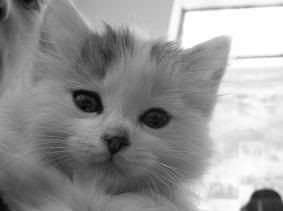
As far as the cat goes, I know a lot of people aren´t very supportive of me having a cat, but I want you to reconsider. It´s actually really nice to have something to take care of, not to mention the obvious benefits of unconditional comfort and companionship. The thing that I like best about having the cat is that it makes it a lot easier to go out into the community on days when I might otherwise like to stay in my room and just read. It automatically opens people up to me in a way that has softened the transition a bit. Maybe they just like to pet my kitten because it´s cute, or maybe they just laugh at the way it rides around on my shoulder, but either way that´s a laugh or a smile that might otherwise have taken longer to encounter.
It´s scientifically proven; kittens make you 100% more kid-friendly.

Anyway, I´m doing the best I can to take care of her, too, looking up all kinds of advice on raising kittens and such.

¨Kauri¨ in quechua means ¨monster¨. It was not easy choosing a name; I got lots of other crazy quechua names suggested but they were all lame like the words for flower, white, or honey or were incredibly difficult to pronounce. Quechua can be like that, really difficult to pronounce. For example, ¨llajllaykamayuj¨ means "carpenter." Also, the cat is by no means sweet or a flower, so i thought "monster" was the most fitting, easy-to-pronounce word i could find. I wanted to name it Inti after the sun god Inti Raymi but everyone seemed to think that was super lame...
I have got to buy that cat a scratching post soon...

Despite the scratches (I admit that most of the bad ones are from bathing her. The little ones are from when she attacks me throughout the night, which unfortunately has not been restricted to my hands and arms), she´s an incredibly adorable, sweet kitten. She´s just a little dependant on me, so I´ve been taking her out a lot more to interact with more people and animals.
It´s pretty cute but sad...anytime I leave without her she climbs up me like this.

Well, my internet time is about running out again. Next time I hope to post a brief overview of some social and political situations that shape the way of live here in Bolivia. Hugs and such,
Sarita
My site is the little green blob in the center of all that beautiful Altiplano nothingness.

Although my site and the people are awesome, I have admittedly been in a bit of an adjustment funk. I´m sure it happens to plenty of volunteers and it will pass as I settle in more.
I watched “Our Brand is Crisis” this week and it was really good. I recommend it to all of you for a pretty realistic look at a lot of the conditions here. There was a part at the end that I thought was really interesting:
“Bolivia is a very divided place. I guess the thing is that democracy really depends on material results. If democracy can’t yield benefits for the average person, the average person is not going to have that deep philosophical commitment to democracy like we all do in a very sort of natural, almost genetic sense. You’d better find a way to make sure that it yields benefits pretty soon and that you, where necessary, provide the countries in transition with some support so the people feel like their life is improving as the democracy takes root.” Interesante, indeed.
Wednesday, Thursday, and today there have been festivals in town for the anniversary. Lots of dancing, some races, and very little transportation. Overall, a really good time.
Something I´d meant to mention was all the books I´ve been reading since I got here. These are the ones I´ve gotten through so far:
A Painted House, John Grisham
Sex, Drugs, and Cocoa Puffs,Chuck Klosterman
The Beach House , James Patterson
A Bend in the Road, Nicholas Sparks
In the Company of Angels, Kim Vivian
A Knight of the Word, Terry Brooks (in honor of both Roger and Dan´s enthusiasm for the author)
I´m currently reading Atlas Shrugged, which I am enjoying decidely more than when I first tried to start it, which could have a lot to do with making myself simply read through it rather than try to mark and analyze it. Mr. Moeller would be so disappointed at my defeat. I´d like to read some more substantial books, like this one, seeing as most of the novels that filled up my leisure time during training were pretty much garbage. Then again, it´s not too easy trying to find good books around here.
With no further ado, I present to you all Kauri.

As far as the cat goes, I know a lot of people aren´t very supportive of me having a cat, but I want you to reconsider. It´s actually really nice to have something to take care of, not to mention the obvious benefits of unconditional comfort and companionship. The thing that I like best about having the cat is that it makes it a lot easier to go out into the community on days when I might otherwise like to stay in my room and just read. It automatically opens people up to me in a way that has softened the transition a bit. Maybe they just like to pet my kitten because it´s cute, or maybe they just laugh at the way it rides around on my shoulder, but either way that´s a laugh or a smile that might otherwise have taken longer to encounter.
It´s scientifically proven; kittens make you 100% more kid-friendly.

Anyway, I´m doing the best I can to take care of her, too, looking up all kinds of advice on raising kittens and such.

¨Kauri¨ in quechua means ¨monster¨. It was not easy choosing a name; I got lots of other crazy quechua names suggested but they were all lame like the words for flower, white, or honey or were incredibly difficult to pronounce. Quechua can be like that, really difficult to pronounce. For example, ¨llajllaykamayuj¨ means "carpenter." Also, the cat is by no means sweet or a flower, so i thought "monster" was the most fitting, easy-to-pronounce word i could find. I wanted to name it Inti after the sun god Inti Raymi but everyone seemed to think that was super lame...
I have got to buy that cat a scratching post soon...

Despite the scratches (I admit that most of the bad ones are from bathing her. The little ones are from when she attacks me throughout the night, which unfortunately has not been restricted to my hands and arms), she´s an incredibly adorable, sweet kitten. She´s just a little dependant on me, so I´ve been taking her out a lot more to interact with more people and animals.
It´s pretty cute but sad...anytime I leave without her she climbs up me like this.

Well, my internet time is about running out again. Next time I hope to post a brief overview of some social and political situations that shape the way of live here in Bolivia. Hugs and such,
Sarita
Sunday, November 11, 2007
Hello again...this time from Oruro!
Well, I´ve been in my site for a few days now. Work has begun and I finally got a bed. But that´s all to come later. For now, to catch you up on everything post-family-appreciation-lunch. After that, we said goodbye to our host families. I was really touched (albeit sad) at how attached my host family got to me. My host mom cried twice about me leaving! That was really shocking for me.
Well, I suppose the next big thing we did was for each trainee to go on a week-long site visit to make sure that everything was suitable, etc. My work partner already changed twice since the application was made by the town to have a volunteer, but I think my new work partner is going to be a good match. Site visit was really interesting, particularly given that this was my first time in the Altiplano. My site is gorgeous! I´ve already told you all I can think to say about it so I´ll just share a picture:

After that we spent a glorious week in a hotel in Cochabamba. It was really good to have time with my training group before heading off to my site for good. I also went back to my host family to pick up the kitten. I guess things haven´t been going very well for my host sister. I feel awful for her whole situation and my thoughts are definitely with the family.
We spent Halloween together and two of my friends and I went as different kinds of potatoes in Bolivia. There are at least hundreds of kinds of potatoes here and they are a main staple, served with every meal, so we thought it was appropriate to dress as them. LtoR: I was papalisa, Lindsay was chuno, and Joy was yuca. The girl in front, Laurie, was a Bolivian school girl and yes they do dress like that for the most part.

After Halloween was swear-in. It really meant a lot to me, although I´m finding it difficult to express why or how. I guess it just gave a much more official sense of purpose to what we´re doing. The ambassador even spoke, which was cool. I knew all along how important this is to me, but this was different. I couldn´t help but think about all the reactions that people have had to me applying to Peace Corps and about how I´m finally here and I´m finally doing it. It was hard to keep it together at times and I´m sure I didn´t hear half of the speeches.
Hoping this picture doesn´t get the ambassador in more trouble...;)
B46, sworn in and no ET´s!

I totally had more pictures of my site and the kitten to share with you guys, but unfortunately I didn´t put them on my pen drive. Until next time, pues. In other news, like I said, I started helping with a computer class, which is cool. The guy who runs it just graduated from high school, but he´s knowledgeable and has a better idea than I do of how education generally works in Bolivia. The rest of settling in has been a little rough, but nothing too bad and nothing unexpected. Next time I post I´ll show you pictures from my bday hike, thanks to my awesome site mate!
Well, I suppose the next big thing we did was for each trainee to go on a week-long site visit to make sure that everything was suitable, etc. My work partner already changed twice since the application was made by the town to have a volunteer, but I think my new work partner is going to be a good match. Site visit was really interesting, particularly given that this was my first time in the Altiplano. My site is gorgeous! I´ve already told you all I can think to say about it so I´ll just share a picture:

After that we spent a glorious week in a hotel in Cochabamba. It was really good to have time with my training group before heading off to my site for good. I also went back to my host family to pick up the kitten. I guess things haven´t been going very well for my host sister. I feel awful for her whole situation and my thoughts are definitely with the family.
We spent Halloween together and two of my friends and I went as different kinds of potatoes in Bolivia. There are at least hundreds of kinds of potatoes here and they are a main staple, served with every meal, so we thought it was appropriate to dress as them. LtoR: I was papalisa, Lindsay was chuno, and Joy was yuca. The girl in front, Laurie, was a Bolivian school girl and yes they do dress like that for the most part.

After Halloween was swear-in. It really meant a lot to me, although I´m finding it difficult to express why or how. I guess it just gave a much more official sense of purpose to what we´re doing. The ambassador even spoke, which was cool. I knew all along how important this is to me, but this was different. I couldn´t help but think about all the reactions that people have had to me applying to Peace Corps and about how I´m finally here and I´m finally doing it. It was hard to keep it together at times and I´m sure I didn´t hear half of the speeches.
Hoping this picture doesn´t get the ambassador in more trouble...;)

B46, sworn in and no ET´s!

I totally had more pictures of my site and the kitten to share with you guys, but unfortunately I didn´t put them on my pen drive. Until next time, pues. In other news, like I said, I started helping with a computer class, which is cool. The guy who runs it just graduated from high school, but he´s knowledgeable and has a better idea than I do of how education generally works in Bolivia. The rest of settling in has been a little rough, but nothing too bad and nothing unexpected. Next time I post I´ll show you pictures from my bday hike, thanks to my awesome site mate!
Sunday, October 21, 2007
My apologies...this is going to be a long entry. I finally broke down and bought a pen drive (way out of my training budget) so I could prepare thorough enough entries to keep you aware of all of my adventures.
Anyway, I have some pictures to share that backtrack a lot, so… This first one is of Chris, Alex, Colin, and me in D.C. doing some site seeing during staging.
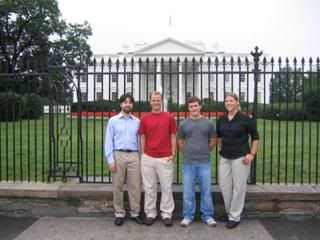
The next three are of our first welcome activity in Cochabamba, a scavenger hunt. There’s me high-fiving a cop, everyone attempting to spell out CORREO in front of the post office, and my group as ninjas.
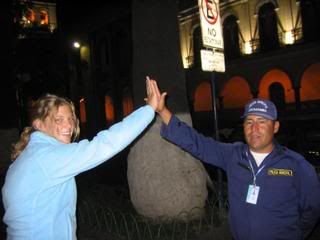
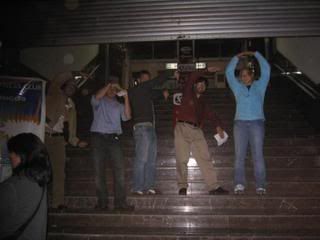
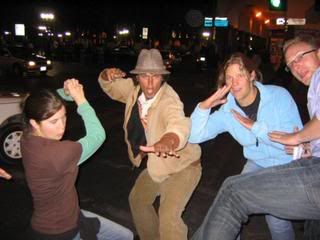
These are some pictures from the little pueblo we lived in during training. The view of Cochabamba is spectacular. You can just barely see the little white Christo in the picture, but trust me that the actual view is much cooler. The last picture is of my host family’s puppy, Perla. Everyone seemed to hate this dog except me. She reminded me of Princess when she was a puppy- so energetic and playful.
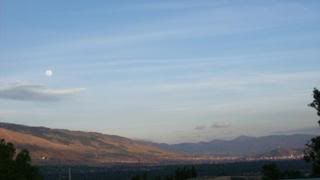
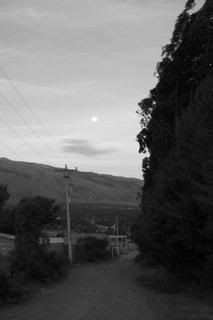

This is Tarata, where we went for technical weekend. I was sick, so I dont really have much more to say about tech weekend, sorry
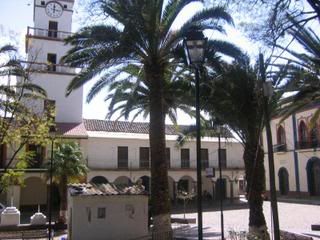
So, we set up a booth at this tourism fair in Cochabamba. While I have no pictures of the actual booth (which would have been cool) to show you, I have this nice picture of me brushing my teeth downtown. Enjoy.
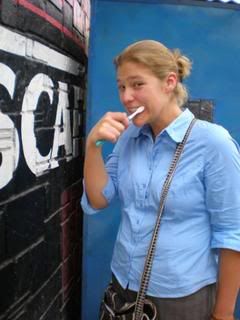
Now, onto the good stuff. So, technical week was arguably the highlight of our training experience. During technical week, we get to travel to a few volunteer sites to see what Peace Corps Bolivia is all about. We see their houses, stay in hotels in the town, and do some work with the people in the towns. We visited three sites; Semaipata, Pucara, and Vallegrande. All of the places we are visited are in the department of Santa Cruz, which is the easternmost department in Bolivia. It’s known for hot weather and jungles. However, we visited towns that aren’t that far east into Santa Cruz, so of the weather wasn’t particularly hot. As we drove to Semaipata (more or less a ten hour drive), it was really interesting to see the landscape change. The hills/mountains in Cochabamba are all very dry and brown right now. A little bit further east, the hills are just covered in fields. It really amazes me that people can farm on that kind of land, and it’s just awesome to see. I don’t know if you can see all of the little plots in the pictures, but it was really neat.
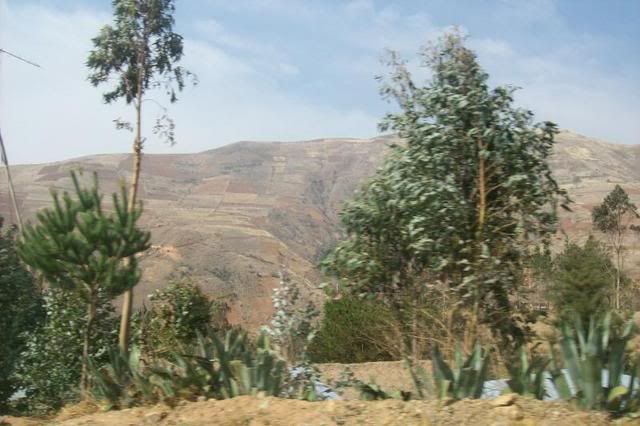
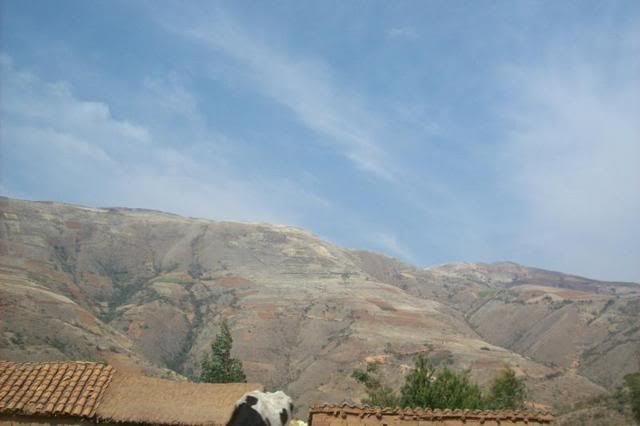
When you go east towards Santa Cruz, though, the climate gets more tropical and the hills are covered in trees. There are a lot more eucalyptus trees and some shorter trees, kind of like the ones you typically think of seeing in Africa. In Semaipata, we were basically just tourists for a day and a half, seeing the town and the nearby waterfalls. The idea behind being tourists was to do a diagnostic/analyze the tourism in Semaipata. To me, Semaipata is an interesting/sad place because, while it has some level of developed tourism, it is mostly run by the Dutch, not Bolivians. The waterfalls/park was really beautiful and relaxing. Plus, it was cool to be in a tropical setting. I’m for sure going to have to vacation at least once in Santa Cruz.
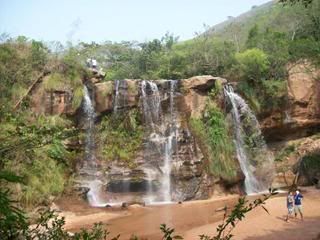
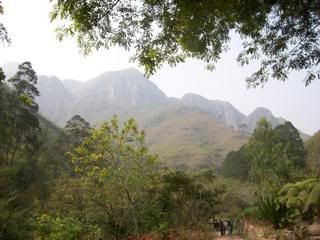
The subject of tourism in Peace Corps Bolivia is interesting and fairly new. Training stresses community tourism, which involves all levels of community members with the idea that the benefits would more evenly reach all levels of the community and the level of which is more suitable for developing towns. Involving the entire community has added benefits because the more the community invests in a project, the more likely it is to be sustainable. Also, the idea is that many of the things that are beneficial to a developing town (infrastructure, better business practices, sanitation, etc.) are necessary for tourism, so the means of development for the two go hand-in-hand. I think the success of such a project depends very much on the site you go to, the time spent there, and the ways in which you go about development. Some sites may very well be ready to implement a responsible, sustainable community tourism plan and others not. It will be interesting to see how this goes.
The second town we visited was Pucara, a small site where a volunteer is about to finish her service. We split up into groups to help some high schoolers put up signs on a hiking trail that led to Incan ruins. I made friends with the cutest little girl and we had a really nice three hour hike. It felt really good to get some exercise and sunshine. It’s difficult for me to feel reassured that what we did that day was sustainable in and of itself, but I think the work, particularly the education part, that the volunteer did there in two years, certainly had a greater impact on the town.
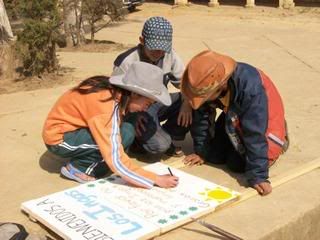
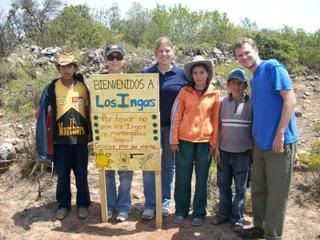
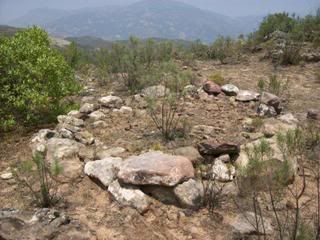
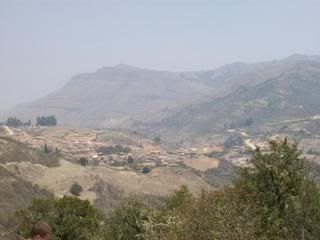
Before leaving Pucara, we took a very short trip to La Higuera. There was a big Che fest in Vallegrande and La Higuera. La Higuera is the community (I’m not sure it’s really big enough to be called a town) where Che Guevara was captured and killed. There’s hardly anything to do there, but there is this giant bust of Che.
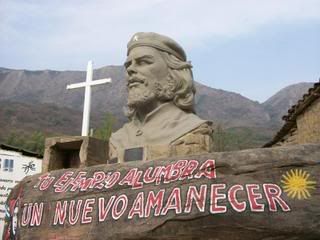
In Vallegrande, we taught classes (in groups of 2-3 trainees) about basic business concepts and lead them through a business simulation in which they made and sold their own products in groups. I was both surprised by the education system here and very proud of our students, two groups of which had a dance (so creative!) and we all went. I enjoyed teaching and really felt like we increased their awareness of some basic business skills. The business sim was the most challenging and my favorite activity thus far.
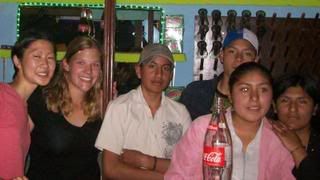
During technical week, our APCD had his final meeting with me about my site. For safety reasons, I’m just going to say that I am going to be in the department of Oruro, which is part of the Bolivian Altiplano, or highlands. If you’d like to know my exact site, feel free to email me, but I’d like it to remain fairly private information. However, I’d be more happy tell you some more about Oruro and the Altiplano in general. (Sidenote: the information provided here is more or less a summary of a general informational Altiplano handout provided to me by the PC. The information here reflects neither my own personal opinions nor those of the Peace Corps. As with anywhere, everyone’s individual experience in the Altiplano will be different.) The work in my site is pretty open-ended and i’ll be the first Microenterprise (MED)/Tourism/ICT volunteer there. That means that my community diagnostic (a three-month process where we basically do a bunch of investigative work, etc. to get to know the community, to assess its needs, and to start to integrate) is going to have to be really thorough, but that the work itself will be pretty flexible based on my interests and the needs of the community. Basically, I’m going to have a multitude of work opportunities at my fingertips and It’s all going to be very beginning level and open-ended. I think the elevation in Oruro is around 12,000 ft, but you might want to check on that because that number is supposedly the average of all of the altiplano, which includes three departments, Oruro, La Paz, and Potosi. The Altiplano is flat and bare, but is surrounded by mountains (duh) as well as having some lakes, mines, the salt flats, and llamas! I don’t know exactly what to expect, since I’ve never been or lived anywhere like that, but I’m excited to find out. I hear there is sun almost everyday, even though it can get pretty cold. The rainiest/warmest months are December to February, although overall the climate is very dry. The main crops of the Altiplano are potatoes, chuños (which I guess are really just potatoes) rice, and other grains, but there is a wide variety of foods available in the city. The altiplano in general is the area of Bolivia with the most indigenous people and the most poverty, although I don’t know how this will be reflected specifically in Oruro or in my site. Also, Bolivia’s current President, Evo Morales, is from a town in Oruro. From what I’ve heard, Oruro is very culturally rich and the people are fantastic. The Altiplano life is said to be very tranquilo, which will be an interesting change. Finally, Orureños are also supposedly extremely politically active. I can’t wait to get to know my new home!
After technical week, we had an official site announcement party so everyone could officially know their sites. Que lujoso, no?
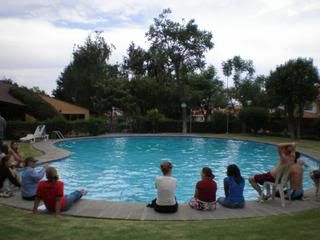
Also, we had a picnic to say thank-you to our host families. Among the highlights of the festivities, there was live music via PC staff, an electric slide performance via our group, and a cueca (Bolivian dance) contest. I borrowed my host grandpa's hat and jacket and my partner, Joy, and I won a three-way tie for first! Joy and I with our language teacher, Maritza.
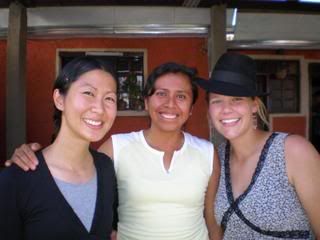
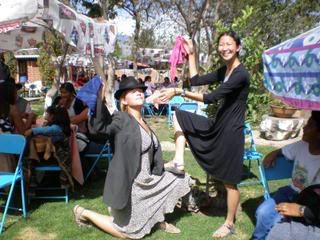
In other news...after site visit Im going back to Marquina to get the kitten my family gave me! Hes so cute, although for now he remains unnamed. Hes the white one...

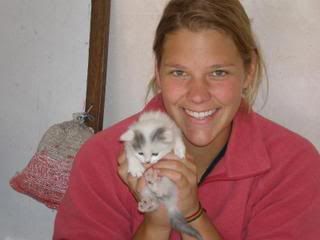
Thats all for now. I hope you are all doing well. I miss you!
-sarita
Anyway, I have some pictures to share that backtrack a lot, so… This first one is of Chris, Alex, Colin, and me in D.C. doing some site seeing during staging.

The next three are of our first welcome activity in Cochabamba, a scavenger hunt. There’s me high-fiving a cop, everyone attempting to spell out CORREO in front of the post office, and my group as ninjas.



These are some pictures from the little pueblo we lived in during training. The view of Cochabamba is spectacular. You can just barely see the little white Christo in the picture, but trust me that the actual view is much cooler. The last picture is of my host family’s puppy, Perla. Everyone seemed to hate this dog except me. She reminded me of Princess when she was a puppy- so energetic and playful.



This is Tarata, where we went for technical weekend. I was sick, so I dont really have much more to say about tech weekend, sorry

So, we set up a booth at this tourism fair in Cochabamba. While I have no pictures of the actual booth (which would have been cool) to show you, I have this nice picture of me brushing my teeth downtown. Enjoy.

Now, onto the good stuff. So, technical week was arguably the highlight of our training experience. During technical week, we get to travel to a few volunteer sites to see what Peace Corps Bolivia is all about. We see their houses, stay in hotels in the town, and do some work with the people in the towns. We visited three sites; Semaipata, Pucara, and Vallegrande. All of the places we are visited are in the department of Santa Cruz, which is the easternmost department in Bolivia. It’s known for hot weather and jungles. However, we visited towns that aren’t that far east into Santa Cruz, so of the weather wasn’t particularly hot. As we drove to Semaipata (more or less a ten hour drive), it was really interesting to see the landscape change. The hills/mountains in Cochabamba are all very dry and brown right now. A little bit further east, the hills are just covered in fields. It really amazes me that people can farm on that kind of land, and it’s just awesome to see. I don’t know if you can see all of the little plots in the pictures, but it was really neat.


When you go east towards Santa Cruz, though, the climate gets more tropical and the hills are covered in trees. There are a lot more eucalyptus trees and some shorter trees, kind of like the ones you typically think of seeing in Africa. In Semaipata, we were basically just tourists for a day and a half, seeing the town and the nearby waterfalls. The idea behind being tourists was to do a diagnostic/analyze the tourism in Semaipata. To me, Semaipata is an interesting/sad place because, while it has some level of developed tourism, it is mostly run by the Dutch, not Bolivians. The waterfalls/park was really beautiful and relaxing. Plus, it was cool to be in a tropical setting. I’m for sure going to have to vacation at least once in Santa Cruz.


The subject of tourism in Peace Corps Bolivia is interesting and fairly new. Training stresses community tourism, which involves all levels of community members with the idea that the benefits would more evenly reach all levels of the community and the level of which is more suitable for developing towns. Involving the entire community has added benefits because the more the community invests in a project, the more likely it is to be sustainable. Also, the idea is that many of the things that are beneficial to a developing town (infrastructure, better business practices, sanitation, etc.) are necessary for tourism, so the means of development for the two go hand-in-hand. I think the success of such a project depends very much on the site you go to, the time spent there, and the ways in which you go about development. Some sites may very well be ready to implement a responsible, sustainable community tourism plan and others not. It will be interesting to see how this goes.
The second town we visited was Pucara, a small site where a volunteer is about to finish her service. We split up into groups to help some high schoolers put up signs on a hiking trail that led to Incan ruins. I made friends with the cutest little girl and we had a really nice three hour hike. It felt really good to get some exercise and sunshine. It’s difficult for me to feel reassured that what we did that day was sustainable in and of itself, but I think the work, particularly the education part, that the volunteer did there in two years, certainly had a greater impact on the town.




Before leaving Pucara, we took a very short trip to La Higuera. There was a big Che fest in Vallegrande and La Higuera. La Higuera is the community (I’m not sure it’s really big enough to be called a town) where Che Guevara was captured and killed. There’s hardly anything to do there, but there is this giant bust of Che.

In Vallegrande, we taught classes (in groups of 2-3 trainees) about basic business concepts and lead them through a business simulation in which they made and sold their own products in groups. I was both surprised by the education system here and very proud of our students, two groups of which had a dance (so creative!) and we all went. I enjoyed teaching and really felt like we increased their awareness of some basic business skills. The business sim was the most challenging and my favorite activity thus far.

During technical week, our APCD had his final meeting with me about my site. For safety reasons, I’m just going to say that I am going to be in the department of Oruro, which is part of the Bolivian Altiplano, or highlands. If you’d like to know my exact site, feel free to email me, but I’d like it to remain fairly private information. However, I’d be more happy tell you some more about Oruro and the Altiplano in general. (Sidenote: the information provided here is more or less a summary of a general informational Altiplano handout provided to me by the PC. The information here reflects neither my own personal opinions nor those of the Peace Corps. As with anywhere, everyone’s individual experience in the Altiplano will be different.) The work in my site is pretty open-ended and i’ll be the first Microenterprise (MED)/Tourism/ICT volunteer there. That means that my community diagnostic (a three-month process where we basically do a bunch of investigative work, etc. to get to know the community, to assess its needs, and to start to integrate) is going to have to be really thorough, but that the work itself will be pretty flexible based on my interests and the needs of the community. Basically, I’m going to have a multitude of work opportunities at my fingertips and It’s all going to be very beginning level and open-ended. I think the elevation in Oruro is around 12,000 ft, but you might want to check on that because that number is supposedly the average of all of the altiplano, which includes three departments, Oruro, La Paz, and Potosi. The Altiplano is flat and bare, but is surrounded by mountains (duh) as well as having some lakes, mines, the salt flats, and llamas! I don’t know exactly what to expect, since I’ve never been or lived anywhere like that, but I’m excited to find out. I hear there is sun almost everyday, even though it can get pretty cold. The rainiest/warmest months are December to February, although overall the climate is very dry. The main crops of the Altiplano are potatoes, chuños (which I guess are really just potatoes) rice, and other grains, but there is a wide variety of foods available in the city. The altiplano in general is the area of Bolivia with the most indigenous people and the most poverty, although I don’t know how this will be reflected specifically in Oruro or in my site. Also, Bolivia’s current President, Evo Morales, is from a town in Oruro. From what I’ve heard, Oruro is very culturally rich and the people are fantastic. The Altiplano life is said to be very tranquilo, which will be an interesting change. Finally, Orureños are also supposedly extremely politically active. I can’t wait to get to know my new home!
After technical week, we had an official site announcement party so everyone could officially know their sites. Que lujoso, no?

Also, we had a picnic to say thank-you to our host families. Among the highlights of the festivities, there was live music via PC staff, an electric slide performance via our group, and a cueca (Bolivian dance) contest. I borrowed my host grandpa's hat and jacket and my partner, Joy, and I won a three-way tie for first! Joy and I with our language teacher, Maritza.


In other news...after site visit Im going back to Marquina to get the kitten my family gave me! Hes so cute, although for now he remains unnamed. Hes the white one...


Thats all for now. I hope you are all doing well. I miss you!
-sarita
Friday, September 28, 2007
Evo
Sorry for the lack of updates, but training has been pretty mundane lately. We're leaving tomorrow for an 8-day technical trip to various cities in Bolivia. I'll write more about that later, but for now...
Click here for a you tube video of Bolivian president Evo Morales' appearance on the Daily Show. It provides a little insight on the Bolivian political climate, particularly in relation to the US.
I love and miss you all!
Sarita
Click here for a you tube video of Bolivian president Evo Morales' appearance on the Daily Show. It provides a little insight on the Bolivian political climate, particularly in relation to the US.
I love and miss you all!
Sarita
Sunday, September 9, 2007
Vamos a bailar!
First of all, thank you for the phone messages! Mom, Jen, Dad...I got your messages. I don´t think it really works for me to message you back, but I appreciate the notes.
Dad- Got the messages, but I can´t use the ´net everyday so it takes a while for me to let you know I got them...sorry.
Jen- I have an address. Mom and dad should have it. Email me if they don´t.
Mom- The time here is currently 1 hour ahead of Chicago time. I´m not sure if Bolivians practice daylight savings. Anytime you want to know the time just search google for ¨current time in bolivia.¨ :) Yes, I sleep under netting and even have a travel net. The biggest threat here is probably Chagas, which in some respects is better and in some worse than Dengue. The food itself is good, but I´m not used to eating mostly rice and potatoes. We don´t have a whole lot of meat or eggs, and even fewer vegetables. The vegetables are available, but I get the feeling that people just don´t eat them. My family usually has bread and coffee for breakfast, soup for lunch, and rice, potatoes, and a bit of meat for dinner. There is also a lot of sugar in anything sweet. I´m not sure about the names thing. I constantly push my family to let me help out a little more, so that´s getting better. The grandma works like crazy and I´m not used to people taking care of me so much. I have a feeling there might be an animal in my future- sorry to disappoint.
So, onto the update. All weekend long there is this festival for the Virgin of Guadalupe. The community invited us to dance in the festival so we´ve been learning the dance all week and (literally) dancing all weekend. It´s been really cool to see all the different dances and to get to participate. Some dances we saw are the Tinku (a battle-type dance), Morenada (a dance from la paz that apparantly mocks the whites who oppressed blacks in the altiplano...or something), and our dance, the Llamerada (the llama-herding dance). I know there was at least one more, but I don´t know what it was.
So, Friday night we danced twice and then my family stayed to watch the tinku. Saturday we danced twice (mind you this is in between other dances) in the morning/afternoon. Then, an entire band accompanied us (dancing) down the (unpaved) streets to the house of a woman who invited us all to lunch, (fried chicken, rice, potatoes, and beer) live music, and some less formal dancing. Then we danced back down the streets to the court where we danced two more times before going home. Our costumes are great, too. The women have like a poodle skirt with llamas instead of a poodle, a blouse, a decorative hat, some rope-like thing to twirl around, and a llama doll to hold. The men have the same hat, a white shirt and white pants. Without further ado, I´ve got some pictures for you...
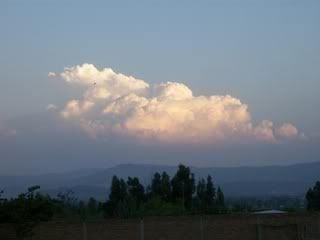
The town I live in
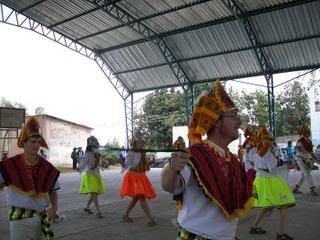 Llamerada Part 1
Llamerada Part 1
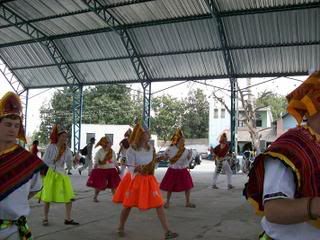 More Llamerada
More Llamerada
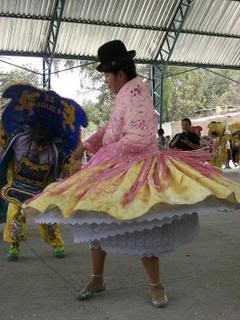
Morenada
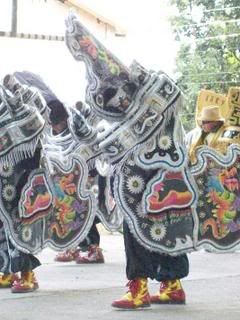 ´
´
Morenada
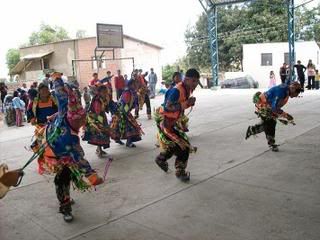
Can´t figure out what this one was...but it was my favorite
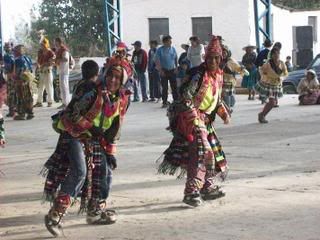
Mystery dance cont´d
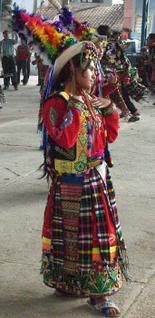
I guess that´s about it for now. Please know that I am going out of my way to update this as much as possible. I love hearing you guys, so thanks for the comments/emails. :)
Sarita
Dad- Got the messages, but I can´t use the ´net everyday so it takes a while for me to let you know I got them...sorry.
Jen- I have an address. Mom and dad should have it. Email me if they don´t.
Mom- The time here is currently 1 hour ahead of Chicago time. I´m not sure if Bolivians practice daylight savings. Anytime you want to know the time just search google for ¨current time in bolivia.¨ :) Yes, I sleep under netting and even have a travel net. The biggest threat here is probably Chagas, which in some respects is better and in some worse than Dengue. The food itself is good, but I´m not used to eating mostly rice and potatoes. We don´t have a whole lot of meat or eggs, and even fewer vegetables. The vegetables are available, but I get the feeling that people just don´t eat them. My family usually has bread and coffee for breakfast, soup for lunch, and rice, potatoes, and a bit of meat for dinner. There is also a lot of sugar in anything sweet. I´m not sure about the names thing. I constantly push my family to let me help out a little more, so that´s getting better. The grandma works like crazy and I´m not used to people taking care of me so much. I have a feeling there might be an animal in my future- sorry to disappoint.
So, onto the update. All weekend long there is this festival for the Virgin of Guadalupe. The community invited us to dance in the festival so we´ve been learning the dance all week and (literally) dancing all weekend. It´s been really cool to see all the different dances and to get to participate. Some dances we saw are the Tinku (a battle-type dance), Morenada (a dance from la paz that apparantly mocks the whites who oppressed blacks in the altiplano...or something), and our dance, the Llamerada (the llama-herding dance). I know there was at least one more, but I don´t know what it was.
So, Friday night we danced twice and then my family stayed to watch the tinku. Saturday we danced twice (mind you this is in between other dances) in the morning/afternoon. Then, an entire band accompanied us (dancing) down the (unpaved) streets to the house of a woman who invited us all to lunch, (fried chicken, rice, potatoes, and beer) live music, and some less formal dancing. Then we danced back down the streets to the court where we danced two more times before going home. Our costumes are great, too. The women have like a poodle skirt with llamas instead of a poodle, a blouse, a decorative hat, some rope-like thing to twirl around, and a llama doll to hold. The men have the same hat, a white shirt and white pants. Without further ado, I´ve got some pictures for you...

The town I live in
 Llamerada Part 1
Llamerada Part 1 More Llamerada
More Llamerada
Morenada
 ´
´Morenada

Can´t figure out what this one was...but it was my favorite

Mystery dance cont´d

I guess that´s about it for now. Please know that I am going out of my way to update this as much as possible. I love hearing you guys, so thanks for the comments/emails. :)
Sarita
Subscribe to:
Comments (Atom)













